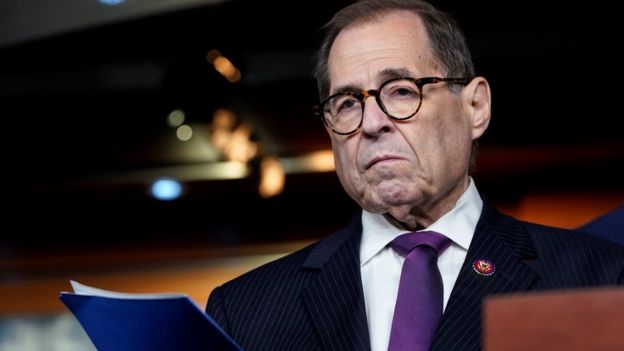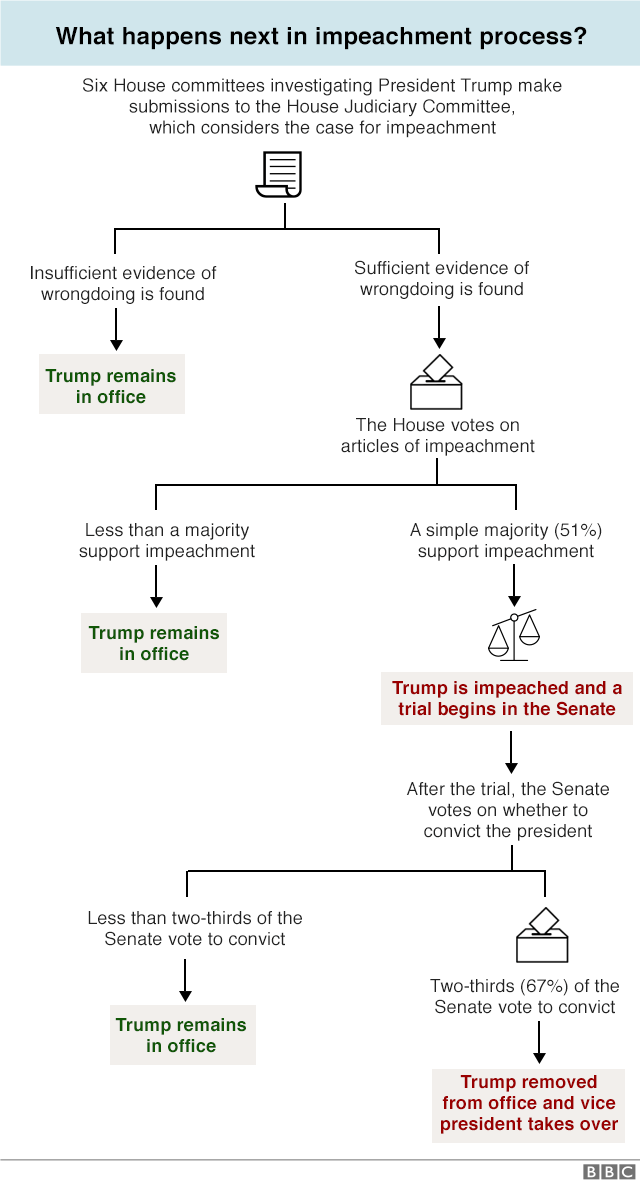The White House has said US President Donald Trump and his lawyers will not attend an impeachment hearing in the House of Representatives on Wednesday.
Mr Trump could not be expected to participate "fairly", White House counsel Pat Cipollone said in a letter to the House Judiciary Committee.
Last week, Chairman Jerrold Nadler said Mr Trump could either attend or "stop complaining about the process".
The White House did not say whether Mr Trump would attend a second hearing.
It said it would respond separately to an invitation to the second hearing - which does not yet have a date set - by Friday.
 Jerrold Nadler said Mr Trump should either attend the hearing or "stop complaining"
In his letter to the president, Mr Nadler said the hearing would be an opportunity to discuss the historical and constitutional basis for impeachment.
"We will also discuss whether your alleged actions warrant the House's exercising its authority to adopt articles of impeachment," he added.
Jerrold Nadler said Mr Trump should either attend the hearing or "stop complaining"
In his letter to the president, Mr Nadler said the hearing would be an opportunity to discuss the historical and constitutional basis for impeachment.
"We will also discuss whether your alleged actions warrant the House's exercising its authority to adopt articles of impeachment," he added.

What did the letter say?
The letter, which has been published by Politico, accused the House committee of a "complete lack of due process and fundamental fairness" in the inquiry. It said the invitation to attend on 4 December would fail to give the White House adequate time to prepare for the hearing and did not give information about the witnesses. Mr Cipollone said press reports suggested witnesses were "apparently all academics" and would include "no fact witnesses". A fact witness testifies their personal knowledge of events while an expert witness assists the judge by offering an opinion. The president's counsel also said that the committee had called three witnesses but allowed Republicans to call just one. Mr Cipollone lambasted Mr Nadler's claim that the process was "consistent" with historical impeachment inquiries, arguing that President Bill Clinton had a fairer hearing in 1998. He said that in order for Mr Trump to be represented in further hearings, Mr Nadler would need to ensure "that due process rights are protected" and that the process was "fair and just".What will happen on Wednesday?
The hearing on Wednesday marks the next stage in the impeachment inquiry, which centres on a July phone call between Mr Trump and Ukrainian President Volodymyr Zelensky. In that call, President Trump asked Mr Zelensky to investigate Joe Biden, currently the front runner to be the Democratic candidate in next year's presidential election, and his son Hunter Biden, who had previously worked for Ukrainian energy company Burisma. The probe is looking into whether Mr Trump used the threat of withholding US military aid to pressure Ukraine into investigating the Bidens. The president has denied any wrongdoing and has called the inquiry a "witch hunt". What does it take to impeach a president? Last week, the House Intelligence Committee wrapped up two weeks of public hearings, which followed several weeks of closed-door witness interviews. Adam Schiff, the Democratic chairman of the Intelligence Committee, said the committees leading the probe - Intelligence, Oversight and Foreign Affairs - are now working on their report, which will be issued on 3 December. On Tuesday, the latest transcript of inquiry evidence was released, detailing testimony by senior budget official Mark Sandy. Mr Sandy told the House investigators that two White House budget officials had resigned following the withholding of military aid to Ukraine. He said that one, a lawyer, had expressed concern that the action could be a violation of a 1974 budget law.What did Jerrold Nadler say?
Mr Nadler wrote to President Trump last Wednesday, inviting him to attend the hearing. "At base, the president has a choice to make," Mr Nadler said in a statement. "He can take this opportunity to be represented in the impeachment hearings, or he can stop complaining about the process. "I hope that he chooses to participate in the inquiry, directly or through counsel, as other presidents have done before him." Jerrold Nadler said Mr Trump should either attend the hearing or "stop complaining"
In his letter to the president, Mr Nadler said the hearing would be an opportunity to discuss the historical and constitutional basis for impeachment.
"We will also discuss whether your alleged actions warrant the House's exercising its authority to adopt articles of impeachment," he added.
Jerrold Nadler said Mr Trump should either attend the hearing or "stop complaining"
In his letter to the president, Mr Nadler said the hearing would be an opportunity to discuss the historical and constitutional basis for impeachment.
"We will also discuss whether your alleged actions warrant the House's exercising its authority to adopt articles of impeachment," he added.
What next with the impeachment inquiry?
The Judiciary Committee is expected to begin drafting articles of impeachment - which are the charges of wrongdoing against the president - in early December. After a vote in the Democratic-controlled House, a trial would be held in the Republican-run Senate. If Mr Trump was convicted by a two-thirds majority - an outcome deemed highly unlikely - he would become the first US president to be removed from office through impeachment. The White House and some Republicans want the trial to be limited to two weeks.
DISCLAIMER: The Views, Comments, Opinions, Contributions and Statements made by Readers and Contributors on this platform do not necessarily represent the views or policy of Multimedia Group Limited.
Latest Stories
-
Give direct access to Global Health Fund – Civil Society calls allocations
3 hours -
Akufo-Addo commissions 200MW plant to boost economic growth
4 hours -
Smallholder farmers to make use of Ghana Commodity Exchange
4 hours -
I want to focus more on my education – Chidimma Adetshina quits pageantry
4 hours -
Priest replaced after Sabrina Carpenter shoots music video in his church
4 hours -
Duct-taped banana artwork sells for $6.2m in NYC
5 hours -
Arrest warrants issued for Netanyahu, Gallant and Hamas commander over alleged war crimes
5 hours -
Actors Jonathan Majors and Meagan Good are engaged
5 hours -
Expired rice saga: A ‘best before date’ can be extended – Food and Agriculture Engineer
5 hours -
Why I rejected Range Rover gift from a man – Tiwa Savage
5 hours -
KNUST Engineering College honours Telecel Ghana CEO at Alumni Excellence Awards
5 hours -
Postecoglou backs Bentancur appeal after ‘mistake’
6 hours -
#Manifesto debate: NDC to enact and pass National Climate Law – Prof Klutse
6 hours -
‘Everything a manager could wish for’ – Guardiola signs new deal
6 hours -
TEWU suspends strike after NLC directive, urges swift resolution of grievances
6 hours

